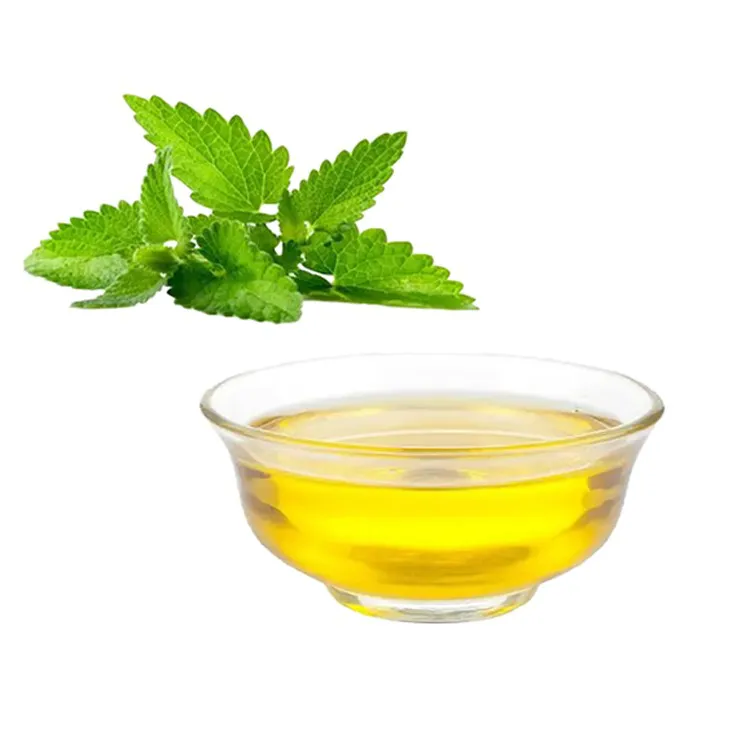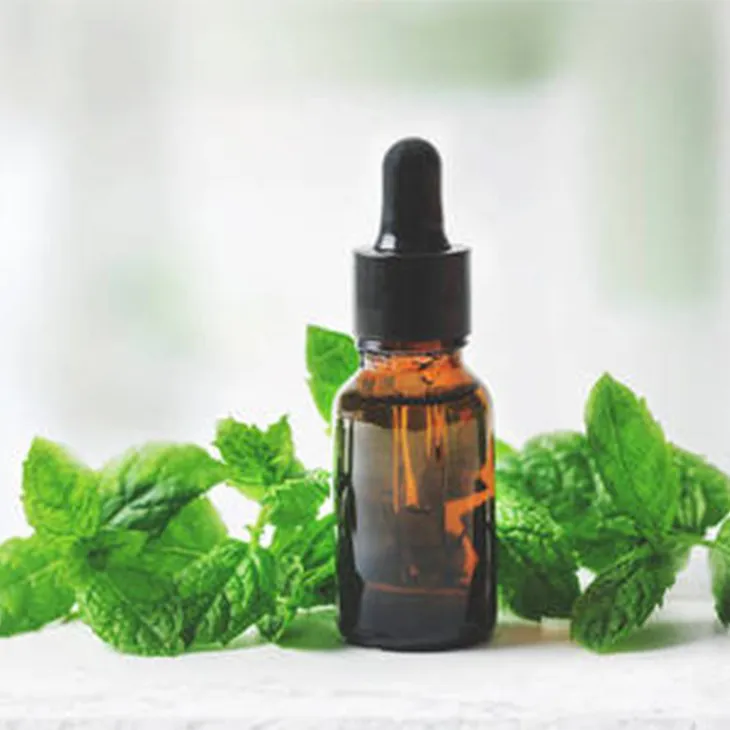- 0086-571-85302990
- sales@greenskybio.com
The Best Herbs for Treating Anxiety and Insomnia: Peppermint Oil
2024-11-11

Introduction
Anxiety and insomnia are two common health issues that can significantly impact a person's quality of life. While there are various treatment options available, many people are turning to natural remedies such as herbs. Peppermint Oil is one such herb that has shown great promise in treating anxiety and insomnia. Derived from the peppermint plant, this natural oil offers a holistic approach to managing these conditions.

Peppermint Oil and Anxiety
Anxiety can be a debilitating condition, causing excessive worry, restlessness, and unease. Peppermint Oil has been found to have a positive impact on the nervous system, making it an effective remedy for anxiety.
The Scent and Its Effects
The refreshing scent of peppermint oil is one of its key features in treating anxiety. When inhaled, the aroma can directly affect the brain and nervous system. It acts as a mild sedative, helping to calm the mind and reduce stress levels. This is because the scent of peppermint has the ability to stimulate certain receptors in the brain that are associated with relaxation.
How It Works on the Nervous System
Peppermint oil contains compounds such as menthol and menthone. These compounds interact with the body's nervous system in a way that promotes relaxation. They can help to regulate the release of neurotransmitters, such as serotonin and dopamine, which play a crucial role in mood regulation. By promoting a more balanced release of these neurotransmitters, peppermint oil can help to alleviate the symptoms of anxiety.

Peppermint Oil and Insomnia
Insomnia, the inability to fall asleep or stay asleep, can have a negative impact on a person's physical and mental health. Peppermint oil has been shown to be beneficial in treating insomnia through several mechanisms.
Regulating the Body's Internal Clock
One of the ways peppermint oil can help with insomnia is by regulating the body's internal clock, also known as the circadian rhythm. This internal clock controls the sleep - wake cycle, and when it is disrupted, it can lead to insomnia. Peppermint oil has been found to have an impact on the genes and hormones that regulate the circadian rhythm, helping to reset it and promote a more normal sleep pattern.
Enhancing Relaxation Before Bedtime
Peppermint oil can also enhance the overall relaxation process before bedtime. Its calming properties can help to relax the muscles and reduce mental tension, making it easier to fall asleep. Whether inhaled or applied topically, it can create a sense of relaxation that is conducive to sleep. For example, adding a few drops of peppermint oil to a warm bath before bed can help to relax the body and prepare it for sleep.

Methods of Using Peppermint Oil for Anxiety and Insomnia
There are several ways to use peppermint oil to treat anxiety and insomnia.
Inhalation
Inhalation is one of the most common methods of using peppermint oil. This can be done in several ways:
- Diffuser: Using a diffuser is a convenient way to disperse the scent of peppermint oil throughout a room. Simply add a few drops of peppermint oil to the diffuser along with water, and turn it on. This allows the aroma to fill the room, creating a relaxing environment.
- Steam Inhalation: Another method is steam inhalation. Boil a pot of water, remove it from the heat, and add a few drops of peppermint oil. Then, place a towel over your head and inhale the steam for a few minutes. This can be especially effective for relieving nasal congestion as well as reducing anxiety.
Topical Application
Peppermint oil can also be applied topically for its relaxing effects. However, it is important to dilute the oil before applying it to the skin, as it can be irritating in its pure form.
- Massage Oil: Mix a few drops of peppermint oil with a carrier oil such as coconut oil or jojoba oil. This mixture can then be used for a relaxing massage. Massaging the oil onto the temples, neck, or shoulders can help to relieve stress and promote relaxation.
- Foot Rub: Applying peppermint oil diluted in a carrier oil to the feet can also be beneficial. The feet have many nerve endings, and massaging the oil into the feet can help to relax the entire body.

Advantages of Peppermint Oil over Traditional Medications
When compared to some traditional medications used to treat anxiety and insomnia, peppermint oil has several advantages.
Accessibility
Peppermint oil is more accessible than many prescription medications. It can be easily purchased at health food stores, pharmacies, or online. There are no strict prescription requirements, making it a convenient option for those who want to try a natural remedy.
Tolerability
Many traditional medications for anxiety and insomnia can have side effects, such as drowsiness, dizziness, or dependence. Peppermint oil, on the other hand, is generally more tolerable for the body. When used properly, it has fewer side effects, making it a suitable option for long - term use. However, it is still important to use it with caution, especially if you have any underlying health conditions or are taking other medications.
Precautions When Using Peppermint Oil
While peppermint oil is generally safe, there are some precautions to keep in mind.
Dilution
As mentioned earlier, peppermint oil should be diluted before topical application. Using undiluted peppermint oil on the skin can cause irritation, redness, or allergic reactions in some people. Always follow the recommended dilution ratios when using peppermint oil for topical applications.
Allergic Reactions
Some people may be allergic to peppermint oil. Before using it for the first time, it is advisable to do a patch test. Apply a small amount of diluted peppermint oil to a small area of skin, such as the inside of the forearm, and wait for 24 hours to see if there is any reaction. If there is redness, itching, or swelling, do not use the oil.
Interaction with Medications
If you are taking medications, it is important to check with your healthcare provider before using peppermint oil. Peppermint oil may interact with certain medications, such as blood thinners or drugs that affect the liver. Your healthcare provider can advise you on whether it is safe to use peppermint oil in combination with your current medications.
Conclusion
Peppermint oil is a natural and effective remedy for anxiety and insomnia. Its ability to act as a mild sedative, regulate the body's internal clock, and enhance relaxation makes it a valuable addition to the range of treatment options available. Whether inhaled or applied topically, it offers a holistic approach to dealing with these common health problems. While it has advantages over some traditional medications, it is important to use it with caution and follow the necessary precautions. Overall, peppermint oil shows great potential as a herbal solution for those seeking natural ways to manage anxiety and insomnia.
FAQ:
Question 1: How does peppermint oil act as a mild sedative for anxiety?
The refreshing scent of peppermint oil has a positive impact on the nervous system, which enables it to act as a mild sedative. It can ease the mind and relieve stress, thus helping those with anxiety.
Question 2: Can peppermint oil really regulate the body's internal clock for insomnia?
Yes, it has been found that peppermint oil can regulate the body's internal clock in relation to insomnia. This helps in improving the sleep - wake cycle.
Question 3: What are the ways to use peppermint oil for anxiety and insomnia?
Peppermint oil can be inhaled or applied topically for dealing with anxiety and insomnia. These methods offer a holistic approach to address these health problems.
Question 4: Why is peppermint oil more tolerable for the body compared to traditional medications?
Peppermint oil is a natural product derived from the peppermint plant. It is generally milder on the body compared to some traditional medications which may have stronger chemical components. So it is more tolerable for long - term use.
Question 5: How does peppermint oil enhance the relaxation process before bedtime?
Peppermint oil can regulate the body's internal clock and has a relaxing effect on the body. This combination helps to enhance the overall relaxation process before bedtime.
Related literature
- The Effects of Peppermint Oil on Nervous System and Sleep"
- "Peppermint Oil: A Natural Remedy for Anxiety and Insomnia"
- "The Therapeutic Properties of Peppermint Oil in Stress - Related Disorders"
- ▶ Hesperidin
- ▶ Citrus Bioflavonoids
- ▶ Plant Extract
- ▶ lycopene
- ▶ Diosmin
- ▶ Grape seed extract
- ▶ Sea buckthorn Juice Powder
- ▶ Fruit Juice Powder
- ▶ Hops Extract
- ▶ Artichoke Extract
- ▶ Mushroom extract
- ▶ Astaxanthin
- ▶ Green Tea Extract
- ▶ Curcumin
- ▶ Horse Chestnut Extract
- ▶ Other Product
- ▶ Boswellia Serrata Extract
- ▶ Resveratrol
- ▶ Marigold Extract
- ▶ Grape Leaf Extract
- ▶ New Product
- ▶ Aminolevulinic acid
- ▶ Cranberry Extract
- ▶ Red Yeast Rice
- ▶ Red Wine Extract
-
Passionflower Extract
2024-11-11
-
Ivy Extract
2024-11-11
-
Hawthorn Extract
2024-11-11
-
Honeysuckle Pollen
2024-11-11
-
Lemon Juice Powder
2024-11-11
-
Lavender Extract
2024-11-11
-
melatonin extract
2024-11-11
-
Peppermint Extract Powder
2024-11-11
-
Fig Extract
2024-11-11
-
Yam Extract
2024-11-11





















